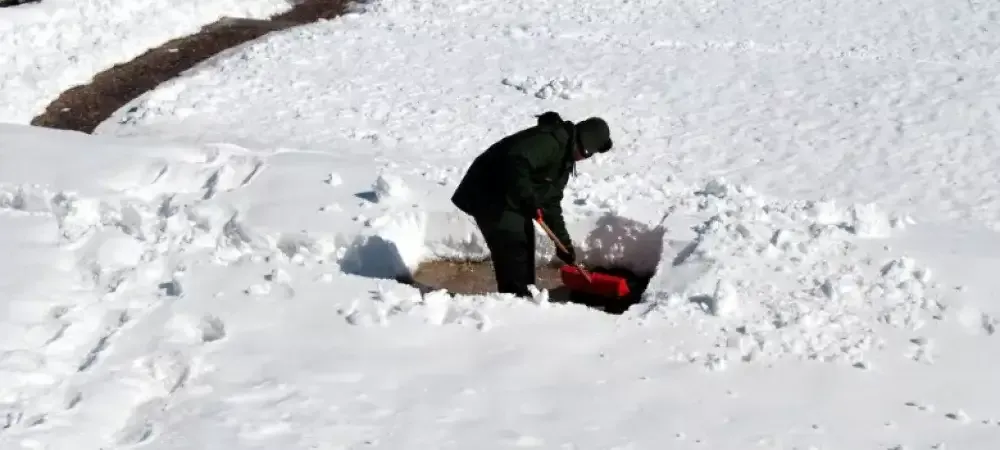How Snow Affects Your Lawn

When the weather outside is frightful, you might enjoy cozying up by the fireplace with a good book or watching Netflix with loved ones—but your lawn doesn't have that luxury! Cold weather and snow can have a big impact on your lawn's overall health and vitality and can affect seed germination.
In Northern Colorado, we're used to some snow and ice—but are you up to date on how to prepare and protect your lawn from winter weather?
- What Does Snow Do To Your Lawn?
- How to Prevent Snow Mold
- How To Protect Your Lawn In The Winter
- FAQ About Winter Lawn Care
What Does Snow Do To Your Lawn?
Here is what actually happens to your lawn under that blanket of snow:
Snow Halts Grass Seed Germination
Have you ever wondered why lawn experts never seed lawns in the wintertime? The reason is that most seeds need warmer temperatures to germinate, and snow halts the germination of seeds altogether. Grass seeds in snow will simply lie there until temperatures rise, so seeding earlier in the season will yield better results.
Ice Can Tear Grass Apart
It’s not just seeds that are vulnerable to winter wear. With snow, sometimes there is ice, and ice can wreak havoc on grass and other plants. Aside from being heavy, ice can actually cause grass and other plant tissues to tear, causing issues down the road.
Snow Increased Nitrogen Levels
As snow falls through the air, it can capture nitrogen. As the snow melts, the nitrogen seeps into the soil and is absorbed by the grass. Nitrogen, which is a common ingredient in most fertilizers, can give your grass an early boost to help it get ready for spring.
Snow Can Insulate The Lawn
A thick blanket of snow can act as an insulator, protecting your grass from bitter nighttime temperatures. Additionally, it can keep in moisture, preventing the turf from drying out during the winter.
Snow Can Lead To Snow Mold
The moisture trapped by the layer of snow can lead to snow mold, a fungus that can cause patches on the grass that are dead, bleached, and matted together. The damage is usually found once the snow begins to melt away from the grass.
How to Prevent Snow Mold
Snow mold is caused when moisture builds up, such as when the snow melts and is not able to drain properly, or when there are dead leaves that get stuck under the snowfall. Snow mold can be identified by a circular, pinkish-gray shape. Here are three steps to prevent snow mold in Colorado.
Aerate Your Lawn
Liquid aeration in the fall opens up the soil and makes it easier for your grass’ roots to breathe and soak in water and nutrients in the winter. Your lawn should be aerated in late summer or fall—especially after an extremely hot summer or if your lawn receives high foot traffic, as that is what compacts the soil in the first place. Don’t schedule your liquid aeration too late in the year—otherwise, your lawn may provoke the growth of snow mold.
Apply Winterizer
Winterizer is a specific blend of lawn fertilizer that is designed to give your lawn the nutrients it needs for the upcoming winter. Ensure your winterize has the right balance of nitrogen, potassium, and phosphorous in order to prevent snow mold. You should apply winterizer in Colorado anytime between late September and early November depending on the weather—as long as it’s applied after the grass stops growing, you’re good to go.
Clean Up Your Yard
While it might be annoying to rake your yard, it’s better for your lawn’s health in the long run. The longer that dead leaves, branches, and other debris stay on your lawn, the more likely your lawn may grow snow mold or another lawn disease. Keeping your yard clean brings you one step closer to having fewer dry and dead spots on your lawn.
How to Protect Your Lawn in the Winter
There are a few ways to ensure that your landscape stays happy and healthy this winter, especially if it snows. Check out the list below for some ideas!
- Keep grass clippings off of your lawn in the late fall before the snow starts to fall. This will cut down on the number of dead clippings trapped under the snow, which will help to prevent snow mold.
- Use mulch or pine straw to help insulate your trees and plant beds. These measures can help protect your plant from big freezes and helps with moisture during the big spring thaw.
- Aerate your lawn in the fall to keep nutrients and moisture flowing freely.
- Make sure that you mow your lawn before the first snowfall. This will help prevent the grass from being damaged by the snow.
- Only water your lawn if the temperature is above 40 degrees and don't water your lawn if there is snow on the ground.
Keeping your lawn safe when the snow starts coming down can be a lot of hard work. Why not let the lawn care experts at American Turf and Tree Care help you keep your landscape beautiful all year long? Learn more about our lawn care in Greeley.
FAQ About Winter Lawn Care
Here are some common questions we get when it comes to winter lawn care.
Will Snow Kill Grass Seed?
Snow will not kill grass seeds—instead, the grass seeds will go dormant until the snow melts in the spring. However, if your seeds have already started to sprowt, the combination of cold temperatures and compacted snow can damage or kill grass seedlings.
Is Snow Good for Your Lawn?
In general, snow is good for your lawn. A layer of snow acts as an insulator, protecting your grass from the cold. Snow also adds moisture to the soil, which is beneficial for grass growth.
However, there are some potential problems that can occur when snow accumulates on your lawn. One is compaction. When snow is packed down by foot traffic or heavy equipment, it can compact the soil and damage the roots of your grass.
Another potential problem is ice formation. If snow melts and then refreezes, it can form a layer of ice on the surface of your lawn. This can damage the blades of grass and make it more difficult for them to absorb nutrients and water from the soil.
Does Snow Make Grass Greener?
Many people believe that snow makes grass greener. While it is true that snow can add some moisture to the soil, it is not enough to make a significant difference in the color of your grass.
